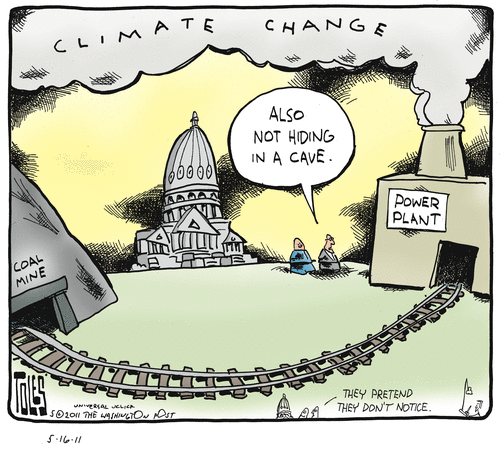
"The numbers are just in. At a time when we need to be urgently reducing our CO2 emissions, we are now emitting more CO2 than any time in human history. However, it's not too late to turn things around."
Thus begins Dana Nuccitelli and John Cook's article, IEA CO2 Emissions Update 2011 - the Good News and the Bad. This article was also published on The Conversation, an Australian website devoted exclusively to articles written by academics. SkS readers are encouraged to check out The Conversation.

Source: Cartoonist Tom Toles slams GOP denial: “They have turned their faces away from climate change in a way that is simply and utterly unforgivable.”, Climate Progress, May 18, 2011
“The northern sites in our monitoring network tell us what is coming soon to the globe as a whole,” said Pieter Tans, an atmospheric scientist with NOAA’s Earth System Research Laboratory (ESRL) in Boulder, Colo. “We will likely see global average CO2 concentrations reach 400 ppm about 2016.”
Source:"Carbon dioxide levels reach milestone at Arctic sites: NOAA cooperative measurements in remote, northern sites hit greenhouse gas milestone in April," National (US) Oceanic and Atmospheric Administration, May 31, 2012
In your opinion, do SkS authors unnecessarily "dog-pile" when rebutting persons posting multiple comments that are purposely designed to provoke controversy?
The University of Western Australia is conducting social science research involving an anonymous survey that explores people’s beliefs about a wide range of topics, ranging from scientific propositions to claims made in the media and on the internet. The survey consists of around 40 questions and should take less than 10 minutes to complete. If you could take the time to fill out the survey, it will help the research effort immensely. The survey is at http://uwa.qualtrics.com/SE/?SID=SV_0UtxttVraAorKNS
Climate feedback: An interaction mechanism between processes in the climate system is called a climate feedback when the result of an initial process triggers changes in a second process that in turn influences the initial one. A positive feedback intensifies the original process, and a negative feedback reduces it.
Climate response: See Climate sensitivity
Climate scenario: A plausible and often simplified representation of the future climate, based on an internally consistent set of climatological relationships that has been constructed for explicit use in investigating the potential consequences of anthropogenic climate change, often serving as input to impact models. Climate projections often serve as the raw material for constructing climatescenarios, but climate scenarios usually require additional information such as about the observed current climate. A climate change scenario is the difference between a climate scenario and the current climate.
Climate sensitivity: In IPCC reports, equilibrium climate sensitivity refers to the equilibrium change in the annual mean global surface temperature following a doubling of the atmospheric equivalent carbon dioxide concentration. Due to computational constraints, the equilibrium climate sensitivity in a climate model is usually estimated by running an atmospheric general circulation model coupled to a mixed-layer ocean model, because equilibrium climate sensitivity is largely determined by atmospheric processes. Efficient models can be run to equilibrium with a dynamic ocean. Appendix II Glossary 79
The transient climate response is the change in the global surface temperature, averaged over a 20-year period, centered at the time of atmospheric carbon dioxide doubling, that is, at year 70 in a 1%/yr compound carbon dioxide increase experiment with a global coupled climate model. It is a measure of the strength and rapidity of the surface temperature response to greenhouse gas forcing.
Source: Annex I (Glossary) to Climate Change 2007: Working Group I: The Physical Science Basis, IPCC Fourth Assessment Report.
A complete listing of the articles posted on SkS during the past week.
A list of articles that are in the SkS pipeline. Most of these articles, but not necessarily all, will be posted during the week.
Dana and John Cook's IEA CO2 Emissions Update 2011 - the Good News and the Bad was re-posted on The Conversation and Renew Economy. Dana's Bob Carter's Financial Post Gish Gallop of Scientific Denial was re-posted on Climate Progress.
ClimateScience.tv’s goal is to present the complete story of the global endeavor to understand and predict climate and environmental change. Through original content and archival footage, we’re working to create a visual library of the past, present, and future of climate science. Our objectives are both simple and ambitious:
The people behind ClimateScience.tv:
Josh Wolfe is an award-winning photographer and filmmaker. He is the co-author, with NASA scientist Gavin Schmidt, of Climate Change: Picturing the Science (W.W. Norton & Company, 2009).
Lizette Gesuden is a video producer and editor. She was an associate producer and assistant editor on the marine science documentary Atlantic Crossing: A Robot’s Daring Mission.
Duane Dobbels is a motion graphic designer with 20 years of experience in live-television and video production.
Posted by John Hartz on Monday, 4 June, 2012
 |
The Skeptical Science website by Skeptical Science is licensed under a Creative Commons Attribution 3.0 Unported License. |